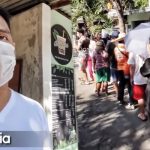Connor Reed, who is known as one of the first British men to contract the coronavirus, shared his entire journey of suffering.
It was at the end of November 2019 when Reed noticed that something was wrong with him and that he was clearly “sick”.
Reed got the common cold and says that most people just ignore this because it is not much of a concern health-wise.

“The first symptoms were just a common cold, and the problem with the common cold is, you don’t think it’s serious”
At stage 1, Reed had all kinds of symptoms and mentioned that this is the point where the infected can infect other people.
“During that time, I had coughs, sniffles, a sort of pain behind the eyes, sinuses, and that’s the stage where it’s most risky because you can inadvertently spread it to other people.”
“It was at that stage where I really didn’t know what it was and nobody knew what it was.”
Reed said the first stage will make you not go to work, but “you’re not going to die”
Stage 2 is getting the flu.
The virus has a temporary recovery stage where patients think they have fully recovered but find themselves sick again after a short while.
“The problem with the coronavirus is you get better before you get worse.”
Reed recovered from the cold and thought that he was okay, but then suffered from flu.
“There were times where I wasn’t really feeling good.”
The flu gave Reed various problems, that he even lost his voice at one point.
“From the flu, I had massive ear problems, and also throat problems. I was coughing so much that my voice died. I sounded like a frog.”
The flu hit him really hard that he described it like he was hit by a truck.
“In the stage where it was more like the flu, I felt like I’d been hit by a truck. It was debilitating.”
Reed developed “not only physical symptoms but [also] mental symptoms”.
“I just didn’t want to do anything.”
Stage 3 was pneumonia, which Reed describes as the ‘scariest’ stage of the virus.
“You have the cold, it gets better, you get the flu, it gets better, then it progresses to pneumonia, and this is where it was the scariest.”
“From the flu. I got better again, and that’s when I had pneumonia. The pneumonia stage was when I went to the hospital.”
This stage was so difficult because Reed couldn’t move without getting exhausted.
https://www.facebook.com/uniladmag/videos/522019521841366/
“It felt like you were breathing through one lung, through a paper bag. You just can’t get that full breath.”
“When I had pneumonia, that’s the point where it was getting quite serious. It felt like I could only use half my lung capacity, and every breath I took wasn’t enough and I just couldn’t get enough air.”
Reed’s journey was a difficult one since no testing kits were made yet.
“The problem I had was that there were no testing kits available. It did take a while for anybody to develop a testing kit so I wasn’t tested for a long time.”
Wuhan is a very bad place to be, says Reed. Things such as coke and other things are hard to get. Businesses have not been operating for more than a month already. People are staying inside their apartments.
People cannot go out alone to shop, everything is done on a ‘community scale’. Reed gets certain vegetables, but meat such as chicken are given whole. The people cannot go outside their gate, so someone would hand them their goods with the use of a long stick to avoid the spread of the virus.
“Everything’s changed, from how we go shopping to how we manage the house … Everybody’s taken the time to adjust and we all have adjusted. It’s a case of people doing the best with what they have.”
If someone wants to leave the community, they will have to leave an ID. They get scanned before going out and going back inside. Their temperature is taken when they come back, and their hands disinfected.
“Also, people individually, they have to manage it themselves and take their own precautions. They can’t rely on the government too much.”
Reed urges the people in the UK to help each other and “not become selfish in the face of crisis.”


